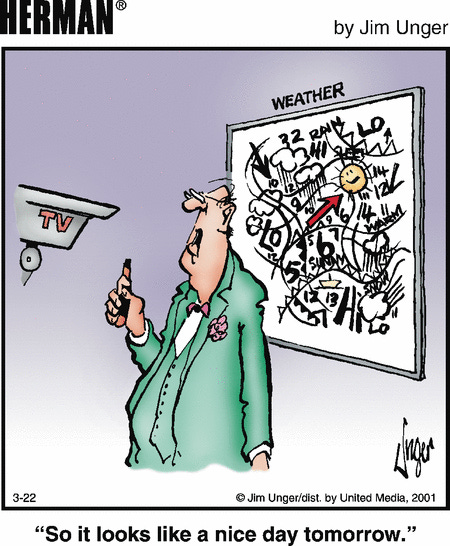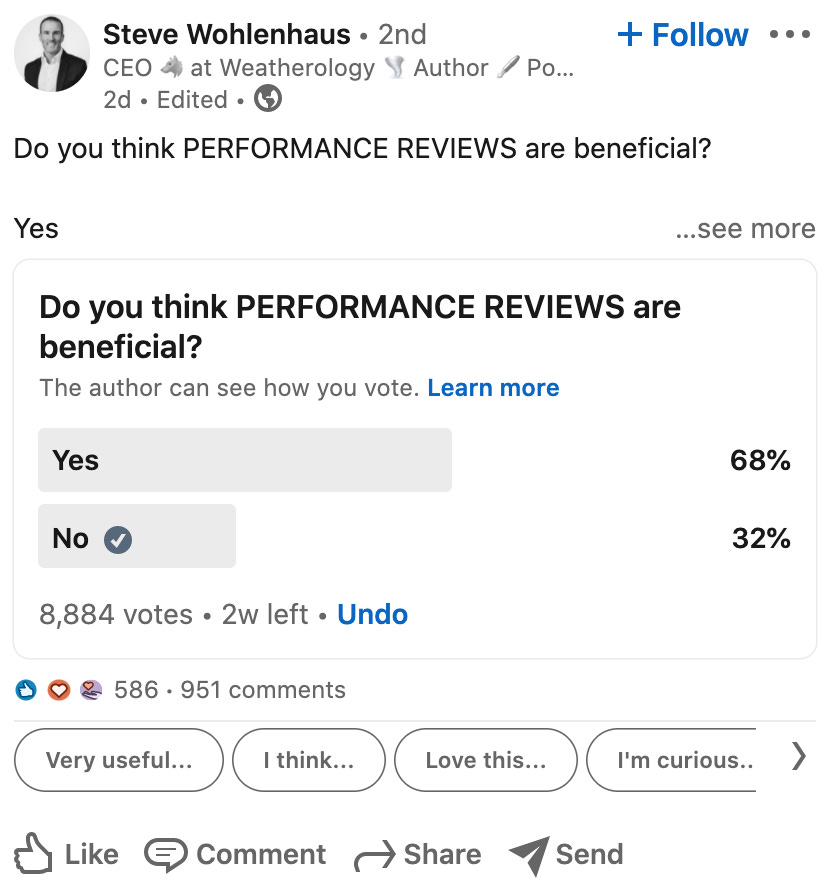Rewarding the Weatherman
Performance Can Not Be Measured - But We Try, Anyway
Performance of the individual can not be measured, except possibly on a long-term basis. This we shall learn from the Red Beads (Ch. 7). Reward for good performance may be the same as reward to the weather man for a pleasant day. The effect of incentive pay is numbers and loss of focus on the aim.
- Dr. W.E. Deming, The New Economics.
A brief post for today inspired by a poll you may have seen circulating on LinkedIn recently. It sums up the pervasiveness of the prevailing style of management:
Whenever I’ve conducted runs of the Red Bead Experiment, participants immediately understand how pointless it is for me to try to induce better performance from them in a “rigged” system: The system dictates how many red beads get pulled into the paddle - doing well is quite literally a matter of luck. In one instance, when a colleague was co-facilitating with me at a conference in Ottawa, we had a participant so annoyed with the charade they announced they were quitting and stormed off the line. According to script, we told them they couldn’t quit because they were fired, and we promptly set about looking for another warm body from the audience to fill the job.
Dr. Deming’s metaphor of rewarding the weatherman is apt: The system they’re responsible for forecasting is beyond their capability to influence, yet on morning news shows there’s still friendly banter about holding them responsible for how a summer long-weekend will turn out. It’s all done with a nod and a wink, but it’s not much different in a lot of organizations, with the exception that there are real repercussions for a bad forecast because it ripples up the chain of command. Consider the following cringeworthy advice I received in a recent newsletter - I suppose if one is going to remain plugged-in to the Matrix, one may as well go all-in:
The flip-side of the coin, punishment for a bad forecast - or worse, just because the system of appraisal requires a capricious sacrifice or two for the common good - can be devastating on morale and engagement. A few years ago, I was working with a senior manager in a large organization who received a poor rating in their appraisal despite putting in Herculean efforts to compensate for a lot of upper management missteps and subterfuge. The mismatch was so significant in their mind between effort and appraisal that they became quite despondent.
I tried to console them by noting in their system, everyone has to take a turn in the barrel, and this was their turn. HR policies dictated a “false scarcity” of ratings be available each year (there can only be so many people who are doing a good job, after all) and this senior manager needed to fall so another could rise. For what good effect, we’re only left to imagine, but to the manager it was damaging to their feeling of pride in their work and engagement. Consider how many management articles you may have read over the past year about addressing “employee engagement” that mentioned anything about the performance appraisal system.
Dr. Deming explains the futility of measuring performance of people with a simple equation that requires solving for two unknowns:
Let x be the contribution of some individual, (yx) the effect of the system on their performance. Then suppose that we have some number for his apparent performance, such as eight mistakes for the year… Then
x + (yx) = 8
We need x. Unfortunately, there are two unknowns and only one equation. Johnny in the sixth grade knows that no one can solve this equation for x. They ignore the other term (yx), which is predominant.
What Are the Alternatives?
Managing systems requires paying attention to people and the psychology of intrinsic motivation. Annual Rating and ranking people should be replaced with annual rating and ranking systems. If we did not achieve the objectives and aims of the system this year, what are we going to do to improve it? How will we work together to close gaps between us and in the fit of the components of our products and services?
Think about your current appraisal system and the effects it has on both the appraiser and the appraised. What are the benefits and downsides? What would be the effect if it was abolished? What would happen? How do you know?




